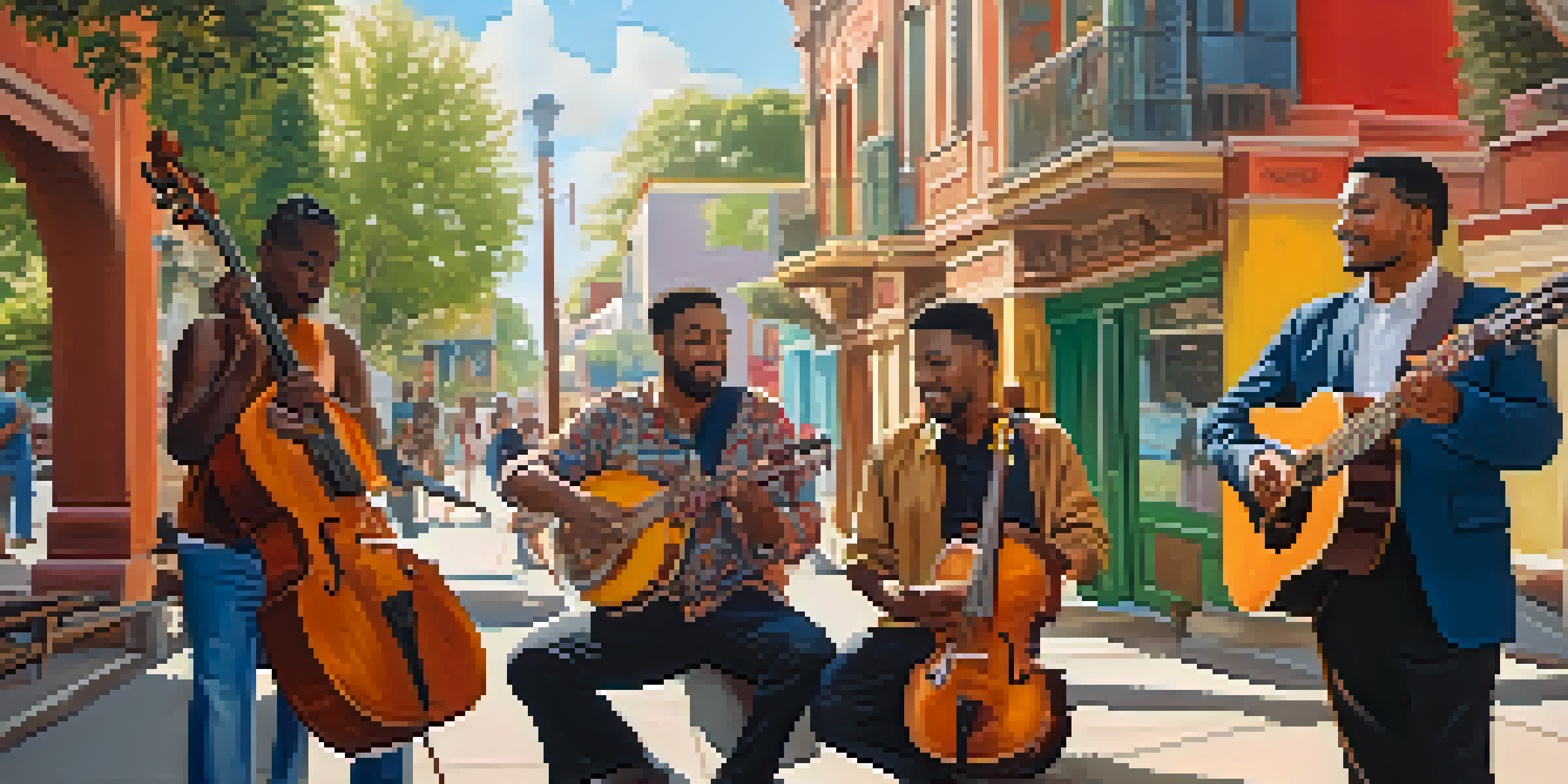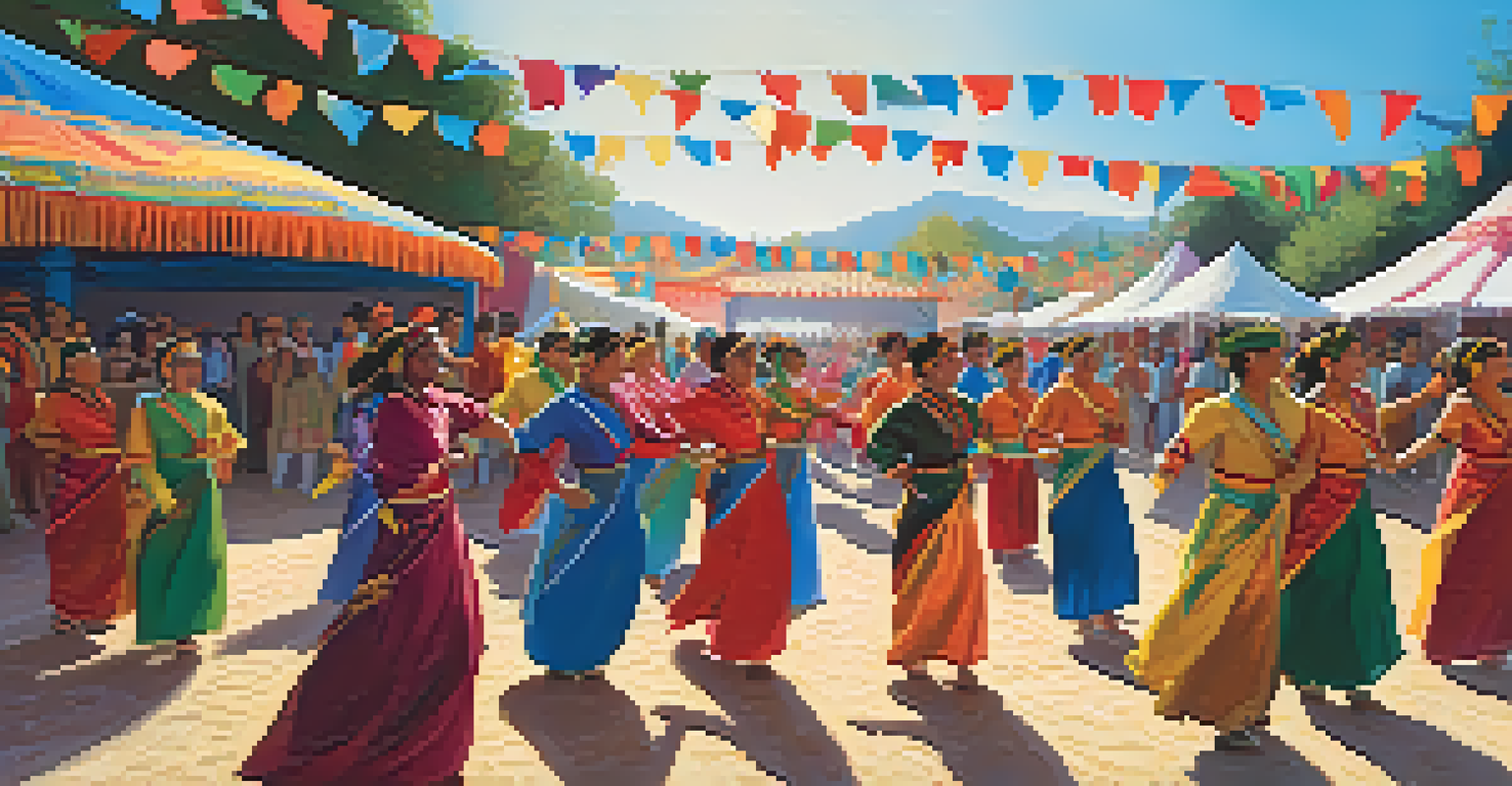Exploring Cultural Themes in Songwriting: A Global Perspective

The Essence of Cultural Identity in Music
Cultural identity is deeply woven into the fabric of music. It's how artists express who they are and where they come from. For instance, traditional folk songs often reflect the history, struggles, and joys of a community, serving as a narrative thread that connects generations.
Music is the shorthand of emotion.
Consider the way Indigenous musicians incorporate their languages and stories into their songs. This not only preserves their heritage but also educates listeners about their culture. The blend of personal and cultural storytelling creates a powerful experience that resonates on multiple levels.
As listeners, we often connect with the emotions conveyed in these songs, even if we don't share the same background. This universal appeal highlights the importance of cultural themes in songwriting, fostering empathy and understanding among diverse audiences.
Global Influences on Contemporary Songwriting
In today's interconnected world, global influences shape contemporary songwriting in fascinating ways. Artists borrow elements from various cultures, creating unique blends that push musical boundaries. For instance, the rise of reggaeton combines Latin rhythms with hip-hop, resulting in a genre that resonates worldwide.

Collaborations between artists from different backgrounds are increasingly common. These partnerships not only bring fresh sounds but also promote cultural exchange. When a pop star teams up with a traditional folk artist, it creates a dialogue between cultures that can inspire and educate fans.
Cultural Identity Shapes Music
Artists express their cultural identity through music, preserving heritage and fostering empathy among diverse audiences.
This cross-pollination enriches the musical landscape, allowing songwriters to explore new themes and ideas. By embracing diverse influences, they can create music that speaks to a global audience while still honoring their roots.
Storytelling: A Universal Language in Songwriting
At its core, songwriting is about storytelling, a universal language that transcends cultural barriers. Every culture has its own tales, myths, and legends that shape its music. For instance, the ballads of Scotland tell stories of love, loss, and adventure, inviting listeners into a world steeped in tradition.
The beauty of music is that it connects people. It brings them together and allows them to share their stories.
Similarly, hip-hop often draws on personal narratives and social issues, reflecting the artist's experiences and environment. By sharing their stories, songwriters create connections with listeners who may relate to similar struggles or triumphs, regardless of their cultural backgrounds.
This emphasis on storytelling fosters a sense of community among listeners. When we hear a song that resonates with our experiences, it reminds us that we are not alone in our journeys, bridging cultural divides through shared emotions.
The Role of Language in Cultural Songwriting
Language plays a pivotal role in cultural songwriting, shaping how themes are expressed and understood. Lyrics can convey intricate emotions, idioms, and cultural references that enrich the listening experience. For example, songs sung in Spanish often utilize poetic devices unique to the language, which may not translate directly into English.
Additionally, bilingual artists often mix languages within their songs, creating a vibrant tapestry of sounds and meanings. This approach not only reflects their cultural identity but also broadens their appeal to diverse audiences. It invites listeners to engage with language in a way that feels authentic and relatable.
Global Influences Enrich Songwriting
Contemporary songwriting is influenced by global collaborations, blending various cultural elements to create unique musical experiences.
Ultimately, the choice of language in songwriting can influence how messages are received. By embracing their linguistic heritage, songwriters can craft lyrics that resonate deeply with their cultural roots while inviting listeners into their world.
Cultural Themes: Love, Struggle, and Celebration
Songwriting often revolves around universal themes such as love, struggle, and celebration, yet each culture interprets these themes uniquely. For instance, love songs in different cultures may express affection through distinct traditions, from serenades in Italian opera to rhythmic chants in African music.
Similarly, songs about struggle often reflect the socio-political contexts of the artists. In the American civil rights movement, music became a powerful tool for advocating change, with artists like Billie Holiday using their platform to address injustices. This cultural lens allows songs to serve as both personal expressions and collective cries for justice.
Celebration is another theme that varies across cultures, with festivals and rituals inspiring lively music. Whether it's the upbeat rhythms of Caribbean carnival or the soulful melodies of a traditional wedding, these songs encapsulate the joy and unity of cultural celebrations.
The Significance of Cultural Preservation in Music
Cultural preservation through music is vital for maintaining heritage in a rapidly changing world. Songwriters often play an essential role in this process by documenting their culture's traditions and values through their art. For example, traditional musicians may incorporate ancient melodies into contemporary compositions, ensuring that these sounds are not lost to time.
Moreover, cultural preservation is increasingly recognized as a way to promote diversity in the music industry. As audiences seek authenticity, artists who honor their roots can carve out unique niches within the broader musical landscape. This not only benefits the artists but enriches the cultural tapestry of music as a whole.
Storytelling Bridges Cultural Divides
Songwriting serves as a universal language, allowing artists to share personal narratives that resonate with listeners across different backgrounds.
In essence, by preserving cultural themes in songwriting, artists celebrate their identities while inviting listeners to appreciate the richness of diverse cultures. It's a reminder that music is not just entertainment; it's a vital part of our shared humanity.
The Impact of Technology on Cultural Songwriting
Technology has revolutionized the way cultural themes are expressed in songwriting. Digital platforms allow artists to share their music with global audiences, breaking down geographical barriers that once limited exposure. This accessibility has led to a fusion of styles and genres, encouraging songwriters to explore diverse influences.
Moreover, social media has become a powerful tool for artists to connect with fans and promote their work. Through platforms like TikTok and Instagram, musicians can share snippets of their songs and engage with listeners in real-time. This direct interaction fosters a sense of community and encourages cultural exchange, making it easier for artists to draw inspiration from different cultures.

However, the impact of technology also raises questions about authenticity and commercialization. As music becomes more globalized, maintaining the integrity of cultural themes while appealing to broader audiences can be a delicate balancing act. Ultimately, technology's influence on cultural songwriting is a double-edged sword, presenting both opportunities and challenges.